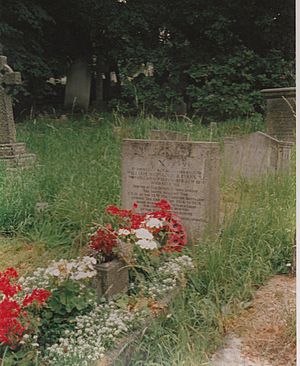George Evans (VC) facts for kids
Quick facts for kids
George Evans
|
|
|---|---|

George Evans grave at Beckenham Cemetery
|
|
| Born | 16 February 1876 Kensington, Middlesex, England |
| Died | 28 September 1937 (aged 61) Anerley, Kent, England |
| Buried |
Elmers End Cemetery, Beckenham
|
| Allegiance | |
| Service/ |
|
| Years of service | 1894–1902, 1915–1919 |
| Rank | Company Sergeant-Major |
| Unit |
|
| Battles/wars | |
| Awards | Victoria Cross |
| Other work | NSPCC Inspector |
William John George Evans (born February 16, 1876 – died September 28, 1937) was a very brave English soldier. He received the Victoria Cross, which is the highest award for bravery in the face of the enemy. This special medal is given to soldiers from Britain and other Commonwealth countries.
Contents
Who Was George Evans?
William John George Evans was born in Kensington, England. He grew up to become a soldier. He is remembered for his incredible courage during World War I.
Early Military Service
George Evans first joined the Scots Guards in March 1894. He served in the army during the Second Boer War. This war took place in South Africa.
After the Boer War, he left the army in August 1902. He then started working for the NSPCC. This organization helps protect children. But when World War I began, he decided to rejoin the army in January 1915.
Bravery at the Somme
In 1916, George Evans was 40 years old. He was a Company Sergeant-Major in the 18th Battalion of The Manchester Regiment. This unit was part of the British Army.
On July 30, 1916, during the Battle of the Somme in France, George Evans showed amazing bravery. The Battle of the Somme was one of the biggest and bloodiest battles of World War I.
A Dangerous Mission
During the battle, five soldiers had tried to deliver an important message, but they were all killed. George Evans bravely volunteered to take the message himself. He had to cross about 700 yards (about 640 meters). The enemy could see this whole area, making it very dangerous.
Despite being wounded, George Evans successfully delivered the message. He was told to go to a medical station for his injury. But he refused and went back to his company instead. The return journey was just as dangerous. He faced 700 yards of heavy rifle and machine-gun fire. He managed to get back by dodging from one shell-hole to another.
After the War
Soon after his brave act, George Evans was captured by the enemy. He spent the rest of World War I as a POW (Prisoner of War).
His Victoria Cross was officially announced in January 1920. It was the very last Victoria Cross awarded for actions during World War I.
George Evans passed away on September 28, 1937. He was buried with full military honors in Elmers End Cemetery in Beckenham, England.
His Victoria Cross medal and other awards are still owned by his family. They have loaned them to the Imperial War Museum in London. You can see them on display in the Lord Ashcroft VC/GC Gallery.
 | James Van Der Zee |
 | Alma Thomas |
 | Ellis Wilson |
 | Margaret Taylor-Burroughs |

